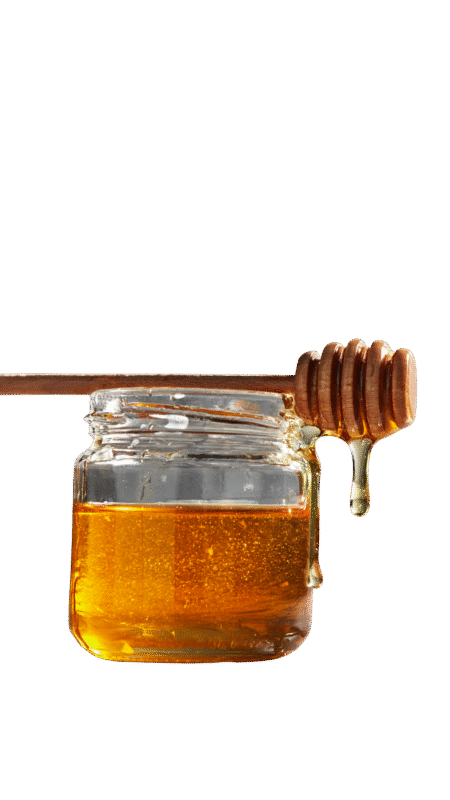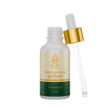Ingredients used in
Rajras Ayurveda Swarnaprasan
1. Suwarna Bhasma
Swarna Bhasma (gold ash) is a traditional Ayurvedic medicine made from purified
gold. It’s considered a potent remedy in Ayurveda and is believed to offer several
benefits when used appropriately under the guidance of an experienced
practitioner. Here are some of the potential benefits:
Rejuvenation and Vitality: Swarna Bhasma is considered a powerful Rasayana
(rejuvenative) agent, helping to enhance energy, vitality, and longevity.
Improves Cognitive Function: It is believed to help improve mental clarity, memory,
and focus, potentially offering benefits for conditions like anxiety or stress.
Boosts Immunity: It is used in Ayurveda to support the immune system, making the
body more resilient to diseases.
Promotes Skin Health: It is sometimes used for skin-related issues, helping to
detoxify the skin and improve its complexion.
Balances Doshas: Swarna Bhasma is believed to help balance the three doshas
(Vata, Pitta, and Kapha) in the body, contributing to overall health and harmony.
Detoxification: It is said to support the body’s natural detoxification processes and
eliminate impurities.
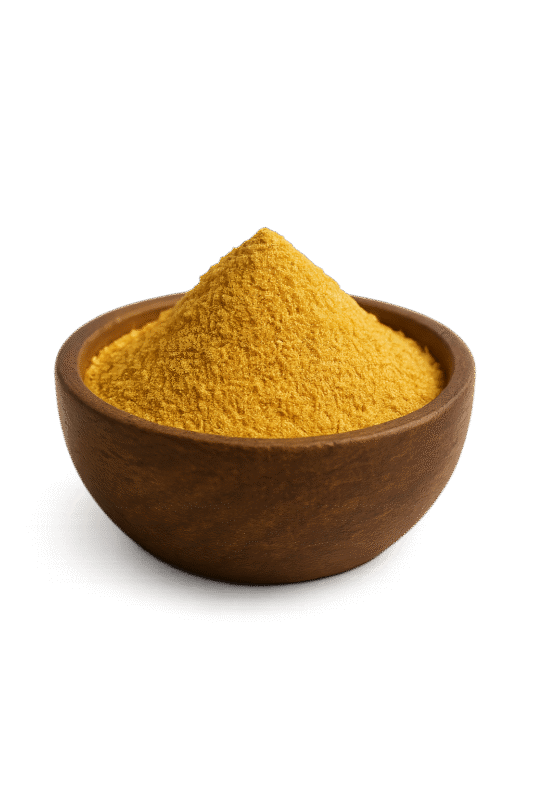
2. Sankhpushpi
Sankhpushpi (Convolvulus pluricaulis) is a herb traditionally used in Ayurvedic medicine
for its various health benefits. Some of the key benefits include:
Cognitive enhancement: It is believed to improve memory, concentration, and overall brain function. It’s often used to enhance mental clarity and reduce stress.
Anxiety and stress relief: Sankhpushpi has calming properties and is used to
help alleviate stress, anxiety, and nervous tension.
Improves sleep: It is known for its mild sedative properties, helping to improve sleep quality and reduce insomnia.
Anti-inflammatory properties: The herb has anti-inflammatory effects that may help in treating various conditions such as joint pain and muscle inflammation.
Supports heart health: Sankhpushpi is believed to have a positive effect on the cardiovascular system, helping to reduce high blood pressure and promote overall heart health.
Enhances digestion: It may help in improving digestion and reducing gastrointestinal discomfort.
Boosts immunity: Its antioxidant properties can help strengthen the immune system.

3. Brahmi
Brahmi, a herb commonly used in Ayurvedic medicine, is known for its numerous health benefits. Here are some of the key ones:
Cognitive Function: Brahmi is often regarded as a brain booster. It is believed to enhance memory, concentration, and overall cognitive function. It may help with conditions like ADHD and anxiety.
Stress and Anxiety Reduction: It has adaptogenic properties, meaning it can help the body cope with stress and reduce anxiety levels.
Improved Mental Clarity: Brahmi is known to improve mental clarity and focus, making it helpful for people with mental fatigue or those looking to improve cognitive performance.
Antioxidant Properties: It contains powerful antioxidants that may help protect the body’s cells from damage by free radicals, promoting overall health and well-being.
Promotes Better Sleep: It has calming effects on the mind and can promote restful sleep by reducing stress and calming the nervous system.
Anti-inflammatory: Brahmi has anti-inflammatory effects that may help in reducing inflammation in the body, potentially benefiting conditions like arthritis.
Supports Heart Health: Some studies suggest that Brahmi can help lower cholesterol and reduce blood pressure, contributing to better heart health.

4. Vacha
Vacha, also known as Acorus calamus, is an herb commonly used in traditional medicine, particularly in Ayurveda. It has several potential benefits, including:
Improves Cognitive Function: Vacha is considered a brain tonic in Ayurveda. It is believed to enhance memory, concentration, and overall cognitive function.
Supports Respiratory Health: It has been traditionally used to help treat conditions like asthma, bronchitis, and coughs, as it has expectorant properties that may help clear mucus from the respiratory tract.
Promotes Digestion: Vacha is sometimes used to aid in digestion, as it can stimulate appetite and alleviate indigestion.
Reduces Stress and Anxiety: It is known for its calming properties and may help relieve stress, anxiety, and even insomnia.
Anti-inflammatory Effects: Vacha contains compounds that may have anti-inflammatory properties, which could be useful for conditions like Arthritis.
Antioxidant Properties: The herb may also help fight oxidative stress, which can protect the body against cell damage.
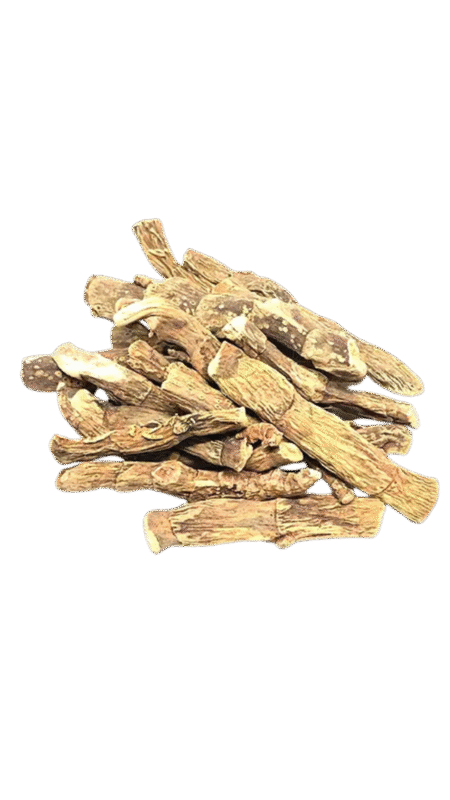
5. Giloy/ Guduchi
Giloy, also known as Tinospora cordifolia, is a powerful herb used in traditional medicine, especially in Ayurveda. It has a wide range of health benefits:
Boosts Immunity: Giloy is known for enhancing the body’s immune response, helping in the prevention and management of infections.
Detoxification: It helps in detoxifying the body by removing toxins and purifying the blood.
Anti-inflammatory: It has anti-inflammatory properties, which can help in reducing inflammation in the body, making it beneficial for conditions like arthritis.
Digestive Health: Giloy can improve digestion by balancing the stomach’s acidity and relieving issues like indigestion and bloating.
Fever Relief: It is commonly used to treat various types of fever, including viral and bacterial fevers, due to its ability to regulate body temperature and fight infections.
Enhances Skin Health: Giloy can help in treating skin disorders like eczema, acne, and psoriasis by purifying the blood and promoting skin healing.
Stress Reduction: It has adaptogenic properties, meaning it helps the body cope with stress and fatigue.
Improves Respiratory Health: Giloy has been used to alleviate symptoms of asthma, allergies, and other respiratory issues by strengthening the lungs.

6. Ashwagandha
Ashwagandha, a popular herb in Ayurvedic medicine, is known for its wide range of health benefits. Here are some of the key benefits:
Stress Reduction: Ashwagandha is often referred to as an adaptogen, meaning it helps the body adapt to stress. It has been shown to lower cortisol levels, which can help reduce stress and anxiety.
Improves Sleep: It may promote better sleep quality, especially for individuals dealing with insomnia or anxiety-related sleep disturbances.
Boosts Energy and Stamina: Ashwagandha can help increase energy levels, enhance physical performance, and improve stamina, making it beneficial for athletes and those dealing with fatigue.
Supports Immune Function: Ashwagandha has immune-boosting properties, helping the body fight off infections and illnesses more effectively.
Enhances Cognitive Function: It is believed to improve memory, concentration, and overall cognitive function. Some studies suggest it may help protect against age-related cognitive decline.
Improves Mood and Reduces Anxiety: Ashwagandha has been shown to help with mood stabilization and reducing symptoms of anxiety and depression.
Hormonal Balance: In men, ashwagandha may help improve testosterone levels and enhance fertility, while in women, it can support hormonal balance and improve reproductive health.
Anti-inflammatory Effects: The herb has anti-inflammatory properties that may help with conditions like arthritis or other inflammatory diseases.
Supports Heart Health: Ashwagandha may help lower blood pressure and cholesterol, contributing to overall cardiovascular health.

7. Cow Ghee
Cow ghee, also known as clarified butter, has been used in traditional cooking and medicine for centuries. It offers several health benefits, including:
Rich in Nutrients: Cow ghee is a good source of fat-soluble vitamins like A, D, E, and K, which are essential for various bodily functions.
Improved Digestion: Ghee contains butyrate, a short-chain fatty acid that supports gut health and can help reduce inflammation in the digestive system.
Boosts Immunity: The antioxidants in ghee help strengthen the immune system by fighting free radicals and oxidative stress.
Enhances Skin Health: The healthy fats in ghee support skin hydration and may improve skin elasticity, promoting a healthy glow.
Supports Brain Function: The omega-3 fatty acids in ghee are beneficial for brain health and cognitive function.
Promotes Heart Health: Despite being a source of saturated fats, ghee in moderate amounts has been shown to improve cholesterol levels and support cardiovascular health when consumed as part of a balanced diet.
Lactose-Free: Since ghee is clarified, it’s virtually free of lactose and casein, making it suitable for people who are lactose intolerant.
Anti-Inflammatory Properties: The presence of butyrate in ghee has been shown to have anti-inflammatory effects, helping reduce chronic inflammation.
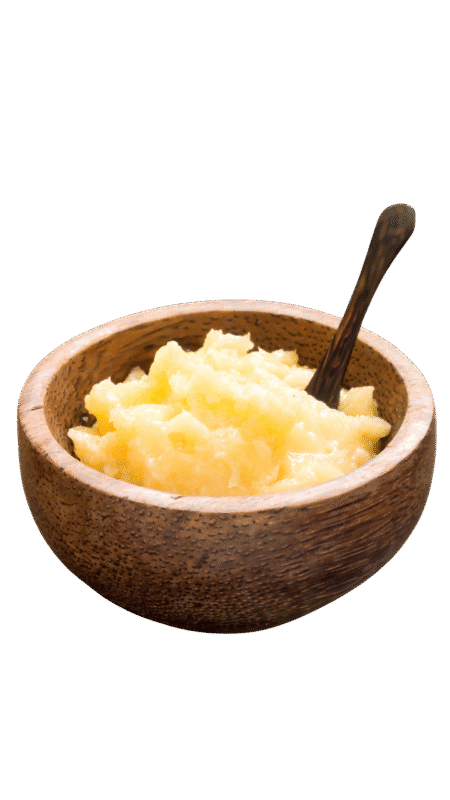
8. Honey
Honey offers a variety of health benefits due to its natural properties. Some key benefits include:
Antioxidant-rich: Honey contains antioxidants that help protect your body from cell damage caused by free radicals.
Antibacterial and antifungal properties: Honey has natural antibacterial properties, which can help in wound healing and preventing infections.
Soothes sore throat: Its soothing texture and antibacterial qualities make honey a popular remedy for sore throats.
Boosts energy: The natural sugars in honey, like glucose and fructose, provide a quick energy boost.
Improves digestive health: Honey can support digestion by promoting the growth of good bacteria in the gut.
Promotes skin health: Honey is often used in skincare routines to moisturize and treat conditions like acne due to its antibacterial properties.
Helps with sleep: Consuming honey before bed can help release melatonin in the brain, promoting better sleep.
